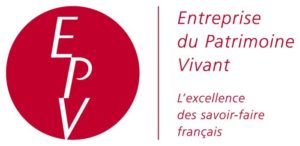Les Entreprises du Patrimoine Vivant (EPV) en Limousin
Environnement, Territoires, Circulations
Environnement, Territoires, Circulations
Doctorat préparé par Arthur Blind sous la direction de Clotilde Druelle-Korn (CRIHAM, Unilim) et Anne Massoni (CRIHAM, Unilim)
Thèse soutenue le 12 septembre 2024
 Le label Entreprise du Patrimoine Vivant (EPV) a été créé par la loi du 2 août 2005 en faveur des PME. Il est destiné à distinguer des entreprises françaises aux savoir-faire artisanaux et industriels d’excellence et à éviter la disparition de talents économiques et culturels d’exception. En juillet 2019, 48 EPV sont recensées dans les trois départements formant l’ancienne région Limousin, et plus d’une trentaine sur le seul département de la Haute-Vienne. Etudier la vitalité des EPV en Limousin invite à réfléchir aux enjeux de l’histoire et de l’actualité du développement économique, social et culturel local.
Le label Entreprise du Patrimoine Vivant (EPV) a été créé par la loi du 2 août 2005 en faveur des PME. Il est destiné à distinguer des entreprises françaises aux savoir-faire artisanaux et industriels d’excellence et à éviter la disparition de talents économiques et culturels d’exception. En juillet 2019, 48 EPV sont recensées dans les trois départements formant l’ancienne région Limousin, et plus d’une trentaine sur le seul département de la Haute-Vienne. Etudier la vitalité des EPV en Limousin invite à réfléchir aux enjeux de l’histoire et de l’actualité du développement économique, social et culturel local.
Pour en bénéficier, les entreprises doivent répondre à différents critères de patrimoine économique, de connaissance de techniques traditionnelles ou de haute technicité, d’ancrage géographique ancien ou d’une grande notoriété. Les critères mêmes d’attribution du label EPV incitent encore à pratiquer la pluridisciplinarité et à décliner les dimensions temporelle, spatiale, économique et culturelle pour comprendre leur existence et leur succès en Limousin. D’où la mobilisation de l’Histoire de l’Histoire économique, ainsi que l’économie territoriale et créative.
Il s’agira donc avant tout d’expliquer comment s’est constitué ce patrimoine vivant, de manière à évaluer l’impact socio-économique et culturel de la labellisation d’entreprises spécifiques au territoire du Limousin et de la Haute-Vienne.
The label Entreprise du Patrimoine Vivant (EPV) was created by the law of 2 August 2005 in favour of SMEs. It is intended to distinguish French companies with excellent crafts and industrial know-how and to avoid the disappearance of exceptional economic and cultural talents. In July 2019, 48 EPVs were identified in the three departments forming the former Limousin region, and more than thirty in the Haute-Vienne department alone. Studying the vitality of EPVs in Limousin invites us to reflect on the historical and current challenges of local economic, social and cultural development.
To benefit from it, companies must meet various criteria in terms of economic assets, knowledge of traditional or highly technical techniques, long-standing geographical roots or high reputation. The very criteria for awarding the EPV label still encourage the practice of pluridisciplinarity and the application of the temporal, spatial, economic and cultural dimensions to understand their existence and success in Limousin. Hence the mobilization of the History of Economic History, as well as the territorial and creative economy.
The main objective will therefore be to explain how this living heritage has been built up, in order to assess the socio-economic and cultural impact of the labelling of companies specific to the Limousin and Haute-Vienne regions.
